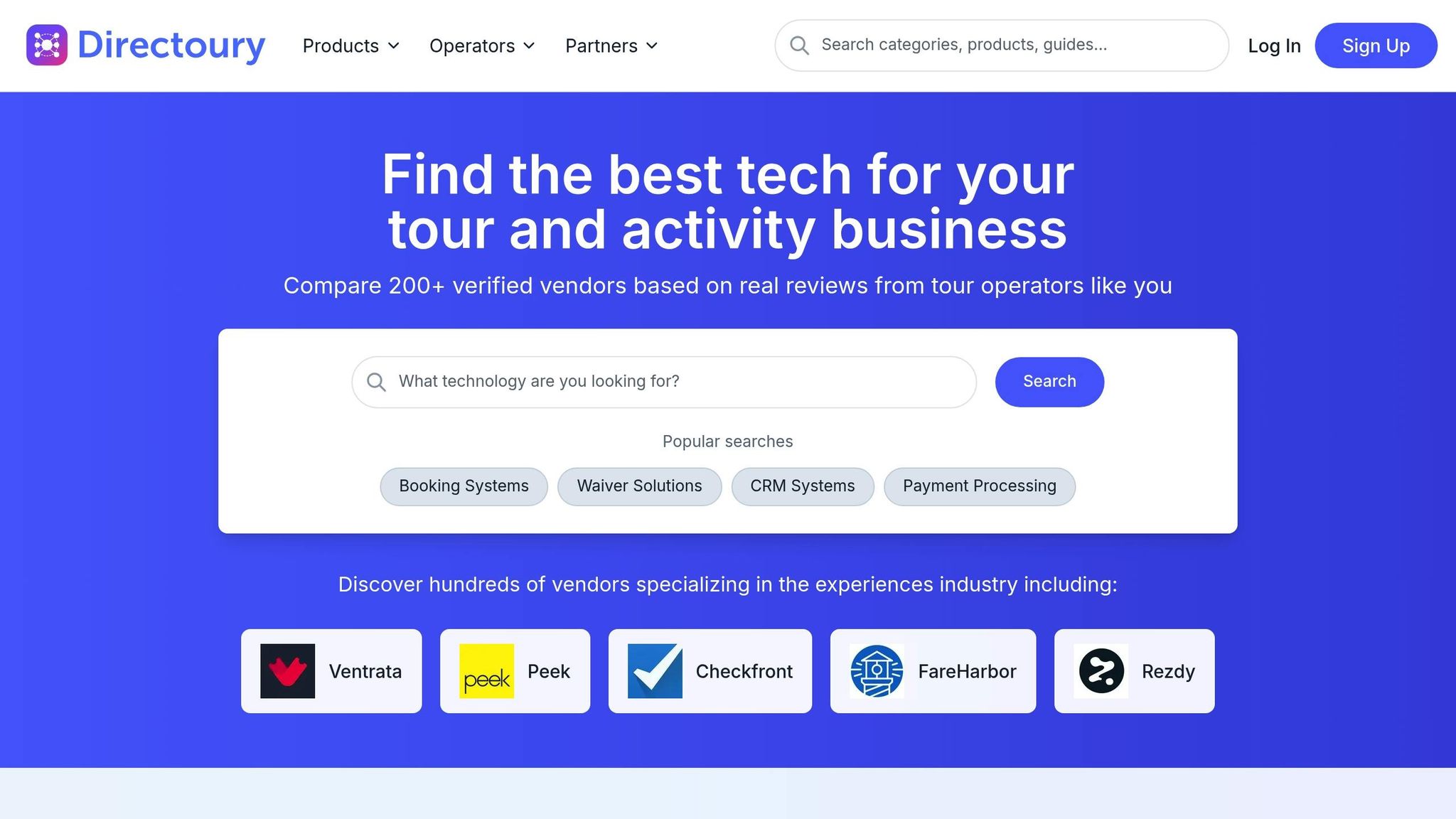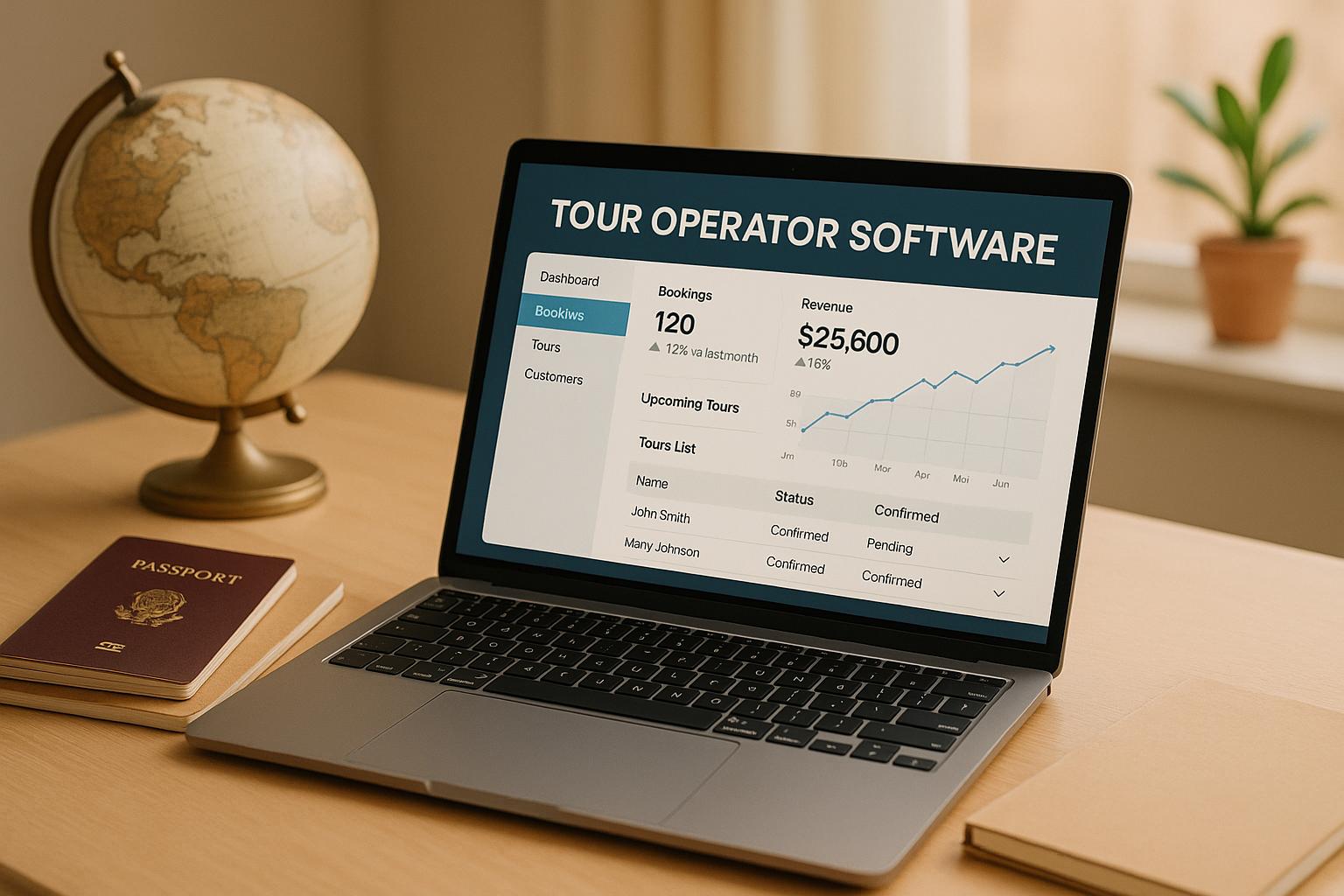Choosing the right tour operator software is critical for managing bookings, payments, and customer relationships effectively. Picking the wrong one can lead to inefficiencies, high costs, and frustrated customers. Here's what you need to know:
- Key Benefits: Automates booking, tracks inventory, integrates payments, and improves customer communication.
- Common Issues: Overpaying for unused features, hidden fees, lack of scalability, and poor mobile functionality.
- Steps to Choose:
- Identify your business needs (e.g., booking volume, payment flexibility, reporting).
- Match software features to your business size and growth plans.
- Ensure mobile access, user-friendly design, and strong customer support.
- Prioritize security standards like PCI DSS compliance for payments.
Pro Tip: Use platforms like Directoury for tailored software recommendations, verified vendor reviews, and detailed buyer's guides. Always test software with demos before committing.
Choosing the right booking system for tour operators
Know Your Business Requirements
Before diving into software demos or comparing features, start by outlining what your business truly needs. This step ensures you focus on tools that support your day-to-day operations instead of getting distracted by flashy extras that won’t add value.
Begin by documenting your current workflow. Identify areas where things could run smoother and understand how your team operates on a daily basis. This will help you zero in on software that simplifies your processes without adding unnecessary complexity. Then, take a closer look at your daily tasks to determine which software features are essential for your business.
Review Your Core Operations
Your daily operations are the best guide to figuring out which features you need most. Map out a typical booking process and note the key steps. Do you primarily deal with walk-in customers, or are most of your bookings made online in advance? Do you have to manage additional logistics, like equipment rentals or dietary accommodations?
Payment processing is another area where needs can vary. If you run high-volume, low-cost tours, you might need a system that processes transactions quickly and efficiently. On the other hand, premium multi-day experiences often require tools for managing deposits, flexible payment plans, and smooth refund handling.
Resource management is also critical for many operators. For instance, an outdoor adventure company might need to track guide availability, equipment maintenance, and staff certifications. Meanwhile, a food tour operator might prioritize managing group sizes, dietary restrictions, or partnerships with local vendors.
Don’t overlook communication needs. Do your guides need real-time access to customer details while in the field? Should customers receive updates about weather changes or last-minute scheduling adjustments? Some businesses may get by with email notifications, while others benefit from SMS alerts or app-based updates for instant communication.
Lastly, think about reporting. A solo operator may only need simple revenue tracking, but larger businesses often rely on performance analytics to make decisions about staffing, inventory, and marketing strategies.
Match Features to Your Business Size
The size of your operation plays a big role in determining which software is right for you. Smaller businesses should avoid overly complex systems designed for large enterprises, as these can be costly and harder to use. Instead, focus on essential features like booking management, basic customer tracking, and simple payment processing.
As your business grows, tools for customer relationship management (CRM) become more important. These can help you track repeat customers, build loyalty, and even run email marketing campaigns to stay in touch with past guests. Basic reporting tools can also help you identify your most profitable tours and busiest seasons.
For larger, established operations with high booking volumes, advanced features become a necessity. Look for systems that offer robust inventory management, detailed reporting, multi-user access with customizable permissions, and integrations with accounting tools like QuickBooks. While these platforms may require a bigger investment, they can save time and reduce errors in complex operations.
Also, consider your team’s technical skills. A system that’s easy for a tech-savvy team might overwhelm those who prefer simple interfaces. Look for platforms that offer both basic and advanced views, so team members can work at their own comfort level.
Plan for Seasonal Changes and Growth
Seasonal demand fluctuations can be a real challenge for tour operators. Booking volumes often spike during peak seasons, and underpowered software can struggle to keep up. Choose a platform that maintains consistent performance, even during your busiest periods, without surprise cost increases or slowdowns.
Scalability is another important factor. A system that works fine during quieter months might lag when demand surges, leading to delays and frustration. Make sure the platform you choose can handle your busiest days without missing a beat.
If you rely on seasonal staff, the software should be intuitive enough for temporary workers to pick up quickly. Complex systems designed for full-time teams can slow things down when new employees are learning the ropes.
Think ahead to your business’s future. Whether you’re planning to expand your offerings or simply grow your customer base, you’ll need software that can adapt. Systems with rigid booking or payment structures might limit your options down the line. As your business scales, reliable data storage and backup features become even more critical to safeguard customer and payment information.
Finally, assess how the software’s pricing aligns with your cash flow. Some platforms charge based on transaction volume, while others offer flat-rate plans. Understanding these differences can help you budget effectively and avoid surprises during peak seasons.
Must-Have Features in Tour Operator Software
Once you've outlined your business needs, it's time to focus on the software features that can directly improve customer engagement and streamline your operations. Prioritize tools that offer strong multi-channel marketing capabilities, enabling you to connect with customers through both digital and traditional platforms. This not only expands your reach but also supports targeted promotions and helps retain loyal clients.
Booking and Payment Processing
Your booking system is the heart of your business. It should handle everything from straightforward single-day tours to intricate multi-day packages. A critical feature to look for is real-time availability updates - this helps avoid double bookings and ensures a smooth customer experience. The software should also support various booking options, whether it's for individual tickets, private group tours, or bundled packages.
Payment flexibility is another must. Modern travelers expect options like partial payments, installment plans, and multiple payment methods, including credit cards, PayPal, and digital wallets. The system should also handle deposits, send automated payment reminders, and process refunds according to your policies.
Seamless integration with your website is essential. Customers should be able to check availability, book tours, and make payments directly on your site. Mobile optimization is equally important, as many travelers book tours on the go using their smartphones or tablets.
Customer Relationship Management (CRM)
A strong CRM system is key to building and maintaining relationships with your customers. It should track details like booking history, preferences, and special requests, enabling you to personalize future interactions. This data can be a goldmine for crafting targeted marketing campaigns and identifying your most loyal clients.
Automation is another crucial feature. A good CRM should handle tasks like sending booking confirmations, pre-tour reminders, and post-tour feedback requests automatically. This keeps customers informed while freeing up your team to focus on other priorities.
Customer segmentation is also vital. The software should allow you to group customers based on their behavior or preferences, enabling you to send tailored offers. For instance, you could promote adventure tours to customers who have previously booked hiking trips or highlight family-friendly options to those who traveled with kids.
Marketing and Integration Tools
In addition to multi-channel support, your software should integrate with popular marketing platforms like email marketing tools, social media schedulers, and review management systems. This creates a connected ecosystem where customer data can flow seamlessly between platforms.
Email automation is especially useful. The software should trigger personalized messages based on customer actions, such as welcome emails for new subscribers, exclusive offers for repeat customers, or re-engagement campaigns for those who haven't booked in a while.
Social media integration is another valuable feature. It makes it easier to showcase customer experiences by collecting and sharing photos, testimonials, and reviews across your digital channels, helping to build trust and attract new clients.
Check Usability, Support, and Security
Once you've pinpointed the features you need, the next step is figuring out how well the software performs in real-life scenarios. Even the most feature-packed platform won't deliver value if it's cumbersome to use or fails to protect customer data. To ensure your choice promotes efficiency, it's crucial to evaluate its usability, support options, and security measures.
Easy-to-Use Design and Mobile Access
A platform with a simple, intuitive design makes it easier for your team to adopt and ensures travelers have a smooth experience.
"Choose a platform that is intuitive and easy to navigate, requiring minimal training for staff and allowing travelers to effortlessly manage their bookings." - WeTravel
Request a demo to get a feel for how the software works beyond what you see in marketing materials. A live demonstration allows you and your team to test navigation, workflows, and overall compatibility with your operations. Involving key team members in this process can provide valuable feedback on how well the platform fits your needs.
Mobile functionality is equally important. With so many travelers relying on smartphones and tablets to research and book trips, the platform's mobile experience should be seamless. Test it yourself by performing tasks like booking a tour, checking availability, or processing a payment on a mobile device. The experience should match the ease of using a desktop, ensuring you can manage operations from anywhere.
Customer Support and Training
Reliable support can make all the difference during the transition to new software. Look for providers that offer multiple support channels, such as phone, email, and live chat. Phone support, in particular, is invaluable for resolving urgent issues quickly.
It's also important to check the provider's availability. If your business operates outside standard hours or serves customers across different time zones, make sure their support team can accommodate your schedule. Ask about response times and whether emergency support is available when you need it most.
Training resources are just as critical. The best providers go beyond basic onboarding, offering video tutorials, detailed documentation, and personalized demos tailored to your business. A strong training program ensures your team can get up to speed quickly, while ongoing resources and updates keep everyone informed about new features and improvements.
Data Security and Legal Compliance
When your software handles sensitive customer information - like payment details, personal data, and travel preferences - security isn't optional. The platform must meet established industry standards and comply with U.S. regulations such as the California Consumer Privacy Act (CCPA).
Look for vendors that use encrypted data transmission, secure payment processing, regular security audits, automatic backups, and strict user access controls. These measures protect your customers' data and build trust in your business.
Don't forget about payment security. Ensure the platform complies with PCI DSS standards to securely handle credit card transactions. Additionally, confirm the platform's backup and recovery capabilities. This includes understanding how often backups are performed, where data is stored, and how quickly it can be restored in case of an issue.
Finally, the software should make it easy to handle customer privacy requests, whether it's providing access to their data or deleting it upon request. This kind of transparency not only keeps you compliant but also reinforces customer confidence in your services.
sbb-itb-3dd36ef
Software That Grows With Your Business
When planning for both steady and seasonal growth, having software that can scale alongside your business is key to staying ahead. Scalable software is designed to manage increasing bookings, resources, and team sizes seamlessly. It accommodates everything from straightforward itineraries to intricate operations, allowing you to introduce new services and expand your offerings as your business evolves.
For tour operators aiming to enter international markets, features like multi-currency and multi-language support are crucial. These capabilities enable you to cater to a variety of audiences and adapt to global demands. A platform equipped with such scalable features becomes a dependable partner, helping your business thrive as it grows.
How Directoury Can Simplify Your Software Selection

Choosing the right tour operator software can feel like a daunting task. That’s where Directoury steps in, making the process smoother by connecting you with trusted technology vendors tailored specifically for the experience economy. Designed exclusively for tour operators and experience-based businesses, Directoury helps you find solutions that truly fit your needs. Let’s break down how its features make software selection easier.
AI-Powered Recommendations
With Directoury, you get AI-driven vendor recommendations tailored to your specific business requirements. This means less time spent sifting through endless options and more time focusing on solutions that align with your operations.
Verified Vendors and Honest Reviews
Directoury hosts a curated directory of over 200 software vendors that specialize in travel and tourism. Along with this, you’ll find authentic user reviews that provide valuable insights into how each solution performs in real-world scenarios. These reviews can help you weigh the pros and cons of each option, giving you a clearer picture of what to expect.
Comprehensive Buyer's Guides
Directoury also provides detailed buyer’s guides packed with practical checklists and comparison tools. These resources are designed to simplify the evaluation process, ensuring you make informed decisions. The platform offers a free Basic Access plan, which allows you to explore the vendor directory and reviews. For those seeking more personalized recommendations and advanced tools, Premium Access is available with custom pricing.
Making the Right Choice for Your Business
Choosing the right tour operator software starts with clearly identifying your business needs and finding a solution that can grow alongside you. It’s about striking the right balance between essential features and practical factors like budget, ease of use, and scalability.
Begin by aligning the software’s capabilities with your core operations. For instance, if you run small group tours with seasonal demand, look for booking systems that excel in managing capacity and offer flexible pricing options. On the other hand, if you manage a larger operation with multiple types of tours, prioritize software with robust CRM tools and detailed reporting features. Keep in mind, the most expensive option isn’t always the best fit - a reasonably priced solution tailored to your needs can often deliver better results.
Data security is non-negotiable. Make sure the software complies with PCI DSS standards to safeguard payment data. If you operate internationally, ensure it also adheres to GDPR regulations to protect customer information. These standards aren’t just requirements - they’re critical for maintaining trust and protecting your reputation.
To simplify the selection process, leverage tools like Directoury’s AI-powered recommendations. This platform connects you with vendors that align with your specific needs, offering access to over 200 verified software providers and genuine user reviews. These insights, based on actual experiences, can guide you toward the right options and prepare you for hands-on testing.
When you’ve narrowed down your choices, take advantage of free trials or demos. Many reputable vendors allow you to test their software using your own data and workflows. Pay close attention to how quickly your team adapts to the system and how responsive the customer support is to your inquiries.
Ultimately, the software you choose should integrate seamlessly into your daily operations. An intuitive interface, clear reporting tools, and reliable support are strong indicators that you’ve found the right fit.
FAQs
How can I make sure the tour operator software I choose will grow with my business?
When selecting tour operator software, it’s important to choose a platform that can keep up with your business as it expands. The right software should handle growing numbers of bookings, customers, and data effortlessly, all while maintaining top-notch performance.
Focus on solutions that offer scalability - think flexible integrations, customizable features, and the capacity to manage higher data loads. This approach minimizes the need for constant system upgrades, letting you concentrate on growing your business without unnecessary disruptions.
What features should I focus on when choosing software for budget-friendly tours versus luxury multi-day experiences?
For cost-effective, high-volume tours, look for tools that offer booking systems capable of managing large volumes, automated confirmation processes to streamline operations, and affordable transaction options to keep costs under control. These features ensure you can handle high demand smoothly without inflating your expenses.
On the other hand, for luxury multi-day experiences, prioritize software that includes advanced CRM features to create personalized customer experiences, customizable itinerary management for tailored travel plans, and detailed reporting tools to fine-tune your services and deliver top-tier experiences. No matter the type of tour, both benefit from having flexible payment solutions and effective marketing tools to attract and retain a broad range of customers.
How does Directoury make choosing the right tour operator software easier?
Directoury makes finding the perfect tour operator software a breeze by providing an all-in-one platform that manages essential tasks like bookings, payments, and customer management. This streamlined approach cuts down on operational headaches and helps reduce mistakes, saving you both time and energy.
Designed with the specific needs of tour operators in mind, Directoury equips you with tools to assess and adopt the best software for your business. Its user-friendly features not only boost efficiency but also enhance customer interactions, allowing you to concentrate on creating unforgettable experiences.




